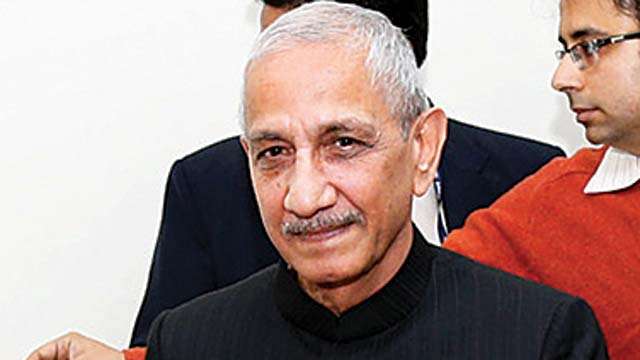Mushtaq-ul-Haq Sikandar
A Two Day Conference was organized on April 17-18, 2012 by Jamsetji Tata Centre for Disaster Management (JTCDM) of Tata Institute of Social Sciences (TISS), Mumbai. The conference was titled as “Structuring Peace: The State and Conflict Transformation: Prospects and Challenges in South Asia”. I was also invited to present a paper at the said conference, on the second day. The different sessions of the conference were good, stimulative, academic as well as deliberative. Though the conference was about whole South Asia, but papers were read only about a few South Asian countries, that too by Indian ‘experts’. On the first day, a beautiful lady presented on “Fragile States in South Asia: An Analysis of Pakistan”. The power point presentation was superb, but the contents and generalizations were too awful at various places. The presentation generated a heated discussion on the generalization of Pakistan as a Failed State. Also the comments and generalizations about Madrasas drew flak too.
The presenter acknowledged that she had based her presentation on the study of secondary sources. Hence the presentation remained of second grade. The presenter had delved on certain U.S think tank sources and data, which labeled Pakistan as a failed State. The presenter time and again also emphasized that according to the data, among the first Top ten failed states, five are Islamic nations.
What characterizes a Failed State? Which are the failed States? Why are they called failed? These and a lot of other questions need to be answered. But here we are not concerned with these queries. The discourse of Failed States belongs to the Dominant hegemonic powers. Failed States discourse can’t be separated from power. For Noam Chomsky a failed state is one that fails “to provide security for the population, to guarantee rights at home or abroad, or to maintain functioning (not merely formal) democratic institutions.” On that definition, Chomsky argues, the United States is the world’s biggest failed state. The yard stick is set by the hegemonic powers whether to label a country as Failed or Not. If a country doesn’t comply with the wishes of hegemonic powers especially Uncle Sam, related various fields especially economic one, it can be labeled as Failed one; threat to the World Peace and attacked in the name of Operation Democracy and Enduring Freedom. It is what has been lucidly exposed by John Perkins in his books particularly in Confessions of an Economic Hitman.
Regarding the Top Five Islamic Nations as being failed, even if we agree with the biased ranking of the World Powers, Islam has nothing to do with it. They can be African or Asian Nations. Islam is one part of their identity and it doesn’t negate the other identities. Neither is the Islamic World a monolith. The structural exploitation prevalent among the world Economic system is more responsible for their failure than any other reason. The authors of Unity or Poverty, (Reginald H green & Ann Seidman, Penguin Books, 1968, P-129), write in the chapter, “Small Countries, Large Firms”, “The divided states of Africa cannot achieve economic independence….The resources of the large firms dominating the export sectors of most states in Africa- like the Uniliver- United Africa Company, Shell-B.P, Societe generale-Union Miniere, the ‘Mauritanian’ iron consortium, ENI, Bethlehem Steel- are far larger than those controlled by the single African state. The inability of individual African states to negotiate on an equal basis with the giant foreign combines is accentuated by the close links and harmony of interest which often-though not always-exists among such firms”. To add insult to injury the chair of the session also declared Pakistan to be a failed state.
The movement demanding creation of Pakistan was a reaction of various grievances of the Muslims of sub continent towards the Hindu majority. The fear of being dominated by Hindu majority in a free India coupled with the Divide and Rule policy of the British colonial masters added fuel to the fire. Hence Pakistan was created and came into being a separate entity on 14 August, 1947. The religion was vehemently used to unite Muslims for the realization of Pakistan. The major basis of separation became the religion.
Since the formation of Pakistan, a tussle ensured on its various fronts especially the Political one. The tussle was whether Pakistan which was created in the name of Islam should have imposition of Shariah or not? The ulama were on the forefront for the imposition of Shariah laws, as a number of them have legitimized the struggle for Pakistan as a duty of Islam and Muslim Faith. But the liberals thought and worked on the opposite lines. This tussle still continues which may at certain times give the outsider an impression that Pakistan is on verge of being declared as a failed state. This sense of failure increased after the end of Cold War when the militants (who were trained with the active help of U.S in order to fight its war against U.S.S.R in Afghanistan) became an independent force to reckon with. They started to act independently though the insurgency in Kashmir in early 1990s kept them busy, hence they didn’t prove a threat to Pakistani State.
In the aftermath of 9/11, Pakistan decided to join the U.S led ‘War on Terrorism’, which was opposed by all the militant organizations. Still they didn’t turn their guns against the state. The moment came when the army and police launched an assault on Jamia Hafsa madrasa of girls in July, 2007. Scores of students died during the siege and attack. Within a few months of the assault the Pakistani army alongwith the U.S support started bombing the tribal areas of Pakistan bordering Afghanistan. These and many other factors led the militants turn their guns against the Pakistani state, that they came to witness as stooge of U.S. It led to a situation of insecurity and massive internal crises within Pakistan, in which hand external factors can’t be ruled out.
Despite the daily attacks and suicide bombings the Pakistani State still hasn’t fragmented. It is not on verge of collapse either. The conditions are ripe for a civil war that the state has successfully contained till now. The removal of once Prime Minister Yusuf Raza Gilani by the judiciary speaks volumes about vibrancy and rule of law in Pakistan. This one step gives hope that Pakistan will survive for the decades to come and will not retrograde as a failed State.














Leave a Reply